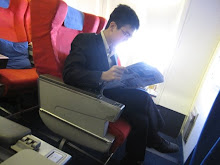The chassis reveals quite a bit about the car. There is also a model of the interior hidden in a box with holes cut into it, much like the peekaboo promo that Proton did for its previous two models. The following are what I gathered on the MPV:
Exterior
- The overall shape is like the Toyota Wish but the rear section of the roof does not slope down slightly like the Wish to improve headroom for the third row.
- Tail lamps use LED and have a vertical design extending from the top to down, unlike the Wish’s which do not extend into the D pillar. The tail lamps are slimmer at the top but curve out a little at the bottom, similar to the Volvo XC90’s design. The signal lamps in the light cluster are positioned towards the top for better visibility. You can actually see this in the previously revealed sketch and the teaser video above.
- There is a wave line on the side profile of the MPV.
- Regular swing doors instead of sliding doors.
- The spare tyre is installed outside under the chassis instead of kept in the car so that you can get access to it easily when the luggage space is occupied.
Interior
- The peekaboo box revealed a two-tone beige interior, but sources in Proton say the colour of the interior has not been finalized. It may be either beige or grey.
- Luggage space is not that great with the third row of seats in place, but can fit one large golf bag. This means balik kampung with 7 people loaded and luggage for 7 will be a challenge.
- Second row splits 60:40 while the third row is a 50:50 split. The seats fold flat.
- Interior roof height is designed to be quite decent to accommodate people who want to ride with songkoks and turbans.
- The shifter uses a gated shift and is dashboard-mounted rather than mounted between the front two seats, a common modern trend with MPV-like vehicles.
- The in-car entertainment is a 2-DIN unit. There are options for a DVD player with an LCD display for the movie mounted at the second row roof area. There is also an option in the future for GPS (Global Positioning System) navigation.
- The 2-DIN head unit is at the top of the center dash area below the aircond vents, and below it comes the air conditioning controls which are three knobs arranged in a triangle shape. Below that is the shifter.
- There are air conditioners blowers for the second and third row situation at the top left and right of the cabin roof (near the grip handles). Proton source says after testing this produced the best airflow.
- There is no armrest between the front two seats but the armrest is instead a fold-down type integrated into the seat itself.
Chassis
- The wheelbase of the chassis is estimated to be more than 2,700mm but less than 2,800mm. In comparison, the Honda Stream has a wheelbase of 2740mm, the Wish is 2,750mm, the Innova 2,750mm, the Livina 2600mm, and the Mazda5 2750mm.
- The front suspension design uses MacPherson struts and the rear design uses a torsion beam to minimize suspension system intrusion into cabin.
- The front end is designed, supplied and assembled as a single module for weight reduction and ease of installation to minimize QC problems.
- The MPV is said to have very good crash safety design from Proton internal crash tests. A few MPVs will be sent for official crash testing and rating soon.
So there you have it. If you want to look at the interior and chassis for yourself you can head to the Proton Technology Week event. The event happens at the Proton plant in Shah Alam. On the KESAS highway heading towards Klang, turn left after the Center of Excellence and then turn left into the Proton plant. I here have a few sample pictures of the new Proton, but not sure whether it's real or not.
Oh well, the competition for the MPV name is over... All I hope is the winner won't be 'Proton Kangkung, Proton Tauke or Proton Siau-Kia. =P




0 comments:
Post a Comment